- Home
- Martin Cruz Smith
Three Stations ar-7
Three Stations ar-7 Read online
Three Stations
( Arkady Renko - 7 )
Martin Cruz Smith
Martin Cruz Smith
Three Stations
1
The summer night swam by. Villages, ripening fields, derelict churches flowed and mixed with Maya's dreams.
She tried to stay awake but sometimes her eyelids had their way. Sometimes the girl dreamt of the train's first-class passengers tucked away asleep in their compartments.
Hard class had no compartments. "Hard class" was a dormitory coach where a few lamps were still lit and snoring, muffled sex, body odor and domestic quarrels were shared by all. Some passengers had been on the train for days and the fatigue of close quarters had set in. A round-the-clock card game among oil riggers soured and turned to resentment and accusations. A Gypsy went from berth to berth hawking the same shawls in a whisper. University students traveling on the cheap were deep in the realm of their headphones. A priest brushed cake crumbs from his beard. Most of the passengers were as nondescript as boiled cabbage. An inebriated soldier wandered up and down the corridor.
Still Maya preferred the rough sociability of hard class to traveling first class. Here she fit in. She was fifteen years old, a stick figure in torn jeans and a bomber jacket the texture of cardboard, her hair dyed a fiery red. One canvas bag held her earthly possessions, the other hid her baby girl of three weeks, tightly swaddled and lulled by the rocking of the train. The last thing Maya needed was to be trapped in a compartment under the scrutiny of snobs. Not that she could have afforded first class anyway.
After all, a train was just a communal apartment on rails, Maya decided. She was used to that. Most of the men stripped to warm-up pants, undershirts and slippers for the duration; she watched for any who had not because a shirt with long sleeves might conceal the tattoos of someone sent to bring her back. Playing it safe, she had chosen an otherwise empty berth. She talked to none of the other passengers and none noticed that the baby was on board.
Maya enjoyed creating stories about new people, but now her imagination was caught up with the baby, who was both a stranger and part of herself. The baby was, in fact, the most mysterious person she had ever met. All she knew was that her baby was perfect, translucent, unflawed.
The baby stirred and Maya went to the vestibule at the end of the car. There, half open to the wind and clatter of the train, she nursed the baby and indulged in a cigarette. Maya had been drug-free for seven months.
A full moon kept pace. From the tracks spread a sea of wheat, water tanks, a silhouette of a shipwrecked harvester. Six more hours to Moscow. The baby's eyes regarded her solemnly. Returning the gaze, Maya was so hypnotized that she did not hear the soldier join her in the vestibule until the sliding door closed behind him and he said smoking was bad for the baby. His voice was a jolt, a connection with reality.
He removed the cigarette from her mouth and snapped it out the vestibule window.
Maya took the baby from her breast and covered herself.
The soldier asked if the baby was in the way. He thought it was. So he told Maya to put the baby down. She held on, although he slid his hand inside her jacket and squeezed her breast hard enough to draw milk. His voice cracked when he told her what else he wanted her to do. But first she had to put the baby down. If she didn't, he would throw the baby off the train.
It took a second for Maya to process his words. If she screamed, could anyone hear her? If she fought, would he toss the baby like an unwanted package? She saw it covered with leaves, never to be found. All she knew was that it was her fault. Who was she to have such a beautiful baby?
Before she could put the baby down, the vestibule door opened. A large figure in gray stepped out, gathered the soldier's hair with the grip of a butcher and laid a knife across his neck. It was the babushka who had been suffering the crumbs of the priest. The old woman told the soldier she would geld him next time they met and gave him a vigorous kick as a demonstration of sincerity. He could not get to the next car fast enough.
When Maya and the baby returned to their berth, the babushka brought tea from the samovar and watched over them. Her name was Helena Ivanova but she said that everyone up and down the line called her Auntie Lena.
Worn-out, Maya finally allowed herself to plunge into true sleep, down a dark slope that promised oblivion. When Maya next opened her eyes sunlight flooded the coach. The train was at a platform and the dominant sound was flies circling in the warm air. The fullness in her breasts was urgent. Her wristwatch said 7:05. The train was expected to arrive at six-thirty. There was no sign of Auntie Lena. Both baskets were gone.
Maya rose and walked unsteadily down the corridor. All the other passengers-the boisterous oil riggers, the university boys, the Gypsy and the priest-were gone. Auntie Lena was gone. Maya was the only person on the train.
Maya stepped onto the platform and fought her way through early-morning passengers boarding a train on the opposite side. People stared. A porter let his baggage cart coast into her shin. The ticket takers at the gate didn't remember anyone resembling Auntie Lena and the baby. It was a preposterous question from a ridiculous-looking girl.
People in the platform area were making good-byes and hundreds circulated around kiosks and shops selling cigarettes, CDs and slices of pizza. A thousand more sat in the haze of a waiting room. Some were going to the wilds of Siberia, some all the way to the Pacific and some were just waiting.
But the baby was gone.
2
Victor Orlov stood in a shower stall, his head bowed and his eyes shut while an orderly clad in a surgical mask, goggles, rubber apron and rubber gauntlets poured disinfectant on Victor's head until it dripped from his nose and four-day stubble, ran down his sunken stomach and naked ass and pooled between his feet. He looked like a wet, shivering ape with patches of body hair, black bruises and toenails thick as horn.
The station medic had been called "Swan" for a long time for his long neck. Having been a pickpocket and snitch, he was proud that he had worked his way to a position of responsibility and opportunity.
"I called as soon as Sergeant Orlov came in. I said to myself, call Senior Investigator Renko. He'd want to know."
"You did the right thing," Arkady said.
As the candle burned it released a florid, slightly rotten odor.
"We do what we can. So, is our old friend Victor using anything new, anything besides alcohol? Heroin, methadone, antifreeze?"
"Alcohol. He's from the old school."
"Well, the disinfectant will kill body lice, bacteria, microbes, fungi and spores. That's a bonus. Your friend's insides I can't do anything about. His blood pressure is low, but that's to be expected. His eyes are dilated, but there are no signs of head trauma. He's just detoxing. I gave him Valium and an injection of B1 to calm him down. We should keep him here for observation."
"In a drunk tank?"
"We prefer 'sobriety station.'"
"Not if he can walk." Arkady held up a plastic bag with a change of clothes.
The orderly in the shower stall unreeled a hose and opened it full force. Victor took a step back as water drummed on his chest. The orderly circled him, hosing Victor from every angle.
It was not easy to be arrested for drunkenness. It was difficult to distinguish drunkenness from, say, sharing a bottle with friends, jolly times, sad times, saint's day, women's day, the urge to nap, the need to hold up a wall, the need to piss on the wall. It was hard to stand out as legitimately drunk when the bar was set so high. The consequences, however, could be dire. The fine was insignificant but family and colleagues would be informed-in Victor's case that would be his commander, who had already threatened to drop him a grade. Worse, multiple offenders had
to spend two weeks in jail. Policemen did not thrive in jail.
A digital clock on the wall flipped to 2400.
Midnight. Victor was four hours late for his shift.
Arkady gathered his clothes from a dimly lit recovery area, moving among the beds of sedated men and urine-soaked sheets. The legs of the beds were sawed off to allow for falls. All the figures were still except for one who twisted against restraining belts and urgently whispered to Arkady, "I am God, God is shit, I am shit, God is shit, God is dog, I am God," over and over.
"You see, we get all types," Swan said. He had Victor's ID, keys, cell phone and handgun waiting when Arkady returned to the desk.
They dried and dressed Victor, trying to keep him from unraveling.
"He's not registered, right?" Arkady just wanted to check.
"He was never here."
Arkady laid fifty dollars on the desk and maneuvered Victor toward the door.
"I am God!" said the voice from the bed.
God is drunk, Arkady thought. Arkady drove Victor's Lada because his own Zhiguli was in the shop awaiting a new gearbox and Victor had lost his license for drunk driving. It didn't matter that Victor had been washed and wore a change of clothes, the smell of vodka came off him like heat from a stove and Arkady cranked a window open for fresh air. The short nights of summer had begun, nothing like the white nights of St. Petersburg but enough to make sleep difficult and aggravate relationships. The police radio maintained a constant squawk.
Arkady handed Victor the walkie-talkie. "Call in. Let Petrovka know that you're on duty." Petrovka was shorthand for militia headquarters on Petrovka Street.
"Who cares? I'm fucked."
But Victor pulled himself together to call the dispatcher. Miraculously no one in his district had been murdered, raped or assaulted all evening.
"Bunch of fairies. Do I have my gun?"
"Yes. We'd hate to see that fall into the wrong hands."
Arkady thought Victor was nodding off but the detective muttered, "Life would be wonderful without vodka, but since the world is not wonderful, people need vodka. Vodka is in our DNA. That's a fact. The thing is, Russians are perfectionists. That's our curse. It makes for great chess players and ballerinas and turns the rest of us into jealous inebriates. The question is not why don't I drink less, it's why don't you drink more?"
"You're welcome."
"That's what I meant. Thank you."
Other cars, beefed-up foreign monsters, roared up behind them but didn't tailgate for long. The Lada's exhaust pipe and muffler hung low and occasionally dragged a rooster tail of sparks, fair warning to keep a safe distance.
If the Lada was a wreck, so were the men in it, Arkady thought. He caught a glimpse of himself in the rearview mirror. Who was this graying stranger who rose from his bed, usurped his clothes and occupied his chair at the prosecutor's office?
Victor said, "I read in the paper about two dolphins trying to drown a man in Greece or someplace. You always hear about noble dolphins saving someone from drowning. Not this time; they were pushing him out to sea. I asked myself what was different about this poor bastard. It turned out he was Russian, naturally, and maybe a little drunk. Why does the reverse of the normal always happen to us? Maybe the dolphins had rescued him a dozen times before. Enough was enough. What do you think?"
"Maybe we should make it official," Arkady said.
"Make what official?"
"Russia is upside down."
Arkady was neither up nor down. He was an investigator who investigated nothing. The prosecutor made sure Arkady followed orders by giving him none to defy. No investigations meant no runaway investigations. Arkady was ignored, welcome to spend his time reading novels or arranging flowers.
Although he had time he hadn't spent it with Zhenya. At fifteen the boy was at the peak of sullen adolescence. Was Zhenya absent from school? Arkady had no say. His status with the boy was not official. All he could offer Zhenya was a clean place to spend the night. Arkady might not see him for a week and then by chance spot Zhenya in his other, secretive life trudging along in a hooded sweatshirt with a street gang. If Arkady approached, Zhenya froze him with a look.
The director of the children's shelter that Zhenya originally came from claimed that the boy and Arkady had a special relationship. Zhenya's father had shot Arkady. If that wasn't special, what was?
The day before, friends brought champagne and cake to celebrate Arkady's birthday, and then gave such rueful, eloquent speeches about the cost of integrity that the women cried. Some of the drunker men too, and Arkady had to go from person to person and reassure them that he was not dead.
He had written a letter of resignation. As of noon today I resign my position in the Prosecution Service of the Russian Republic. Arkady Kyrilovich Renko, Senior Investigator of Important Cases.
But to afford Zurin so much satisfaction was unbearable. Arkady had burned the letter in an ashtray.
And the days marched on.
Arkady had a new neighbor across the hall, a young woman who was out all hours and sometimes needed help finding her latchkey in her voluminous bag. A journalist young enough to burn the candle at both ends. One night she showed up at his door with a black eye and a boyfriend in hot pursuit. The light on the landing was out, as usual, and Arkady did not get a good look at his face. However, the man could see Arkady in the open doorway, gun in hand, and vanished down the stairs in bounds.
"I'm fine. It was nothing," Anya said. "Really, thank you so much, you're the hero of the hour. I must look a mess."
"Who was it?"
"A friend."
"That was a friend?"
"Yes."
"Are you going to report this to the militia?"
"The militia? You must be kidding. Oh, you must be the investigator in the building. I heard about you," she said. "I take back any insinuation about the honesty and integrity of our brave men in their battle against the criminal element in our society."
He heard her whooping and laughing as soon as she was in her apartment. The following night she knocked on Arkady's door and saw the bottles and plates of his birthday celebration scattered around the living room.
"A party?"
"It wasn't the Sack of Rome, just a few friends."
"Next time let me know." From her bag she gave him two tins of Osetra caviar, 125 grams each, together worth almost a thousand dollars.
"I can't."
"We're even. I get these all the time and I hate caviar. Where's the woman who lived here?"
"She left."
"Are you sure you didn't chop her into small pieces and mail her around the country? Just joking. You scared the shit out of my friend. Served him right."
Her name was Anya Rudikova. Oddly enough, he saw her a week later on television, black eye and all, discussing violence in film with the objectivity of a sociologist.
The radio dispatcher called and Arkady picked up on Victor's behalf.
"Orlov."
The dispatcher was cautious. She demanded to know whether he was fit for duty.
"Yes," Arkady said.
"Because when you called earlier you didn't sound so good. People are talking about you."
"Fuck them."
"Well, you do sound better. Can you handle an overdose? The ambulances are running late."
"Where?"
While Arkady listened he executed a satisfying U-turn in the face of oncoming traffic. What tourist maps called Komsomol Square, the people of Moscow called Three Stations for the railway terminals gathered there. Plus the converging forces of two Metro lines and ten lanes of traffic. Passengers pushed their way like badly organized armies through street vendors selling flowers, embroidered shirts, shirts with Putin, shirts with Che, CDs, DVDs, fur hats, posters, nesting dolls, war medals and Soviet kitsch.
During the day Three Stations was in constant motion, a Circus Maximus with cars. At night, however, when the crowds were gone and the square was floodlit and gauzy with i
nsects, Arkady felt that the stations were as exotic as opera sets. Leningrad Station was a Venetian palace, Kazansky Station was an Oriental mosque and Yaroslavl Station wore a clown's face and cap. The night revealed a population that the daytime bustle had obscured: pickpockets, flyboys handing out directions to strip clubs and slot arcades, gangs of street kids looking for the wounded, the slow, the easy mark. Men with vague intentions idled in small groups, beers in hand, watching prostitutes grind by. The women walked with a predatory eye and looked as likely to eat their clients as have sex with them.
Drunks were everywhere, but hard to see because they were as gray as the pavement they sprawled on. They were bandaged or bloody or on crutches like casualties of war. Every doorway had a resident or two; they might be homeless but Three Stations was their roost. A beggar with broad shoulders and withered legs propelled his cart past a Gypsy who absentmindedly pulled out her baby and her breast. At Three Stations the crippled, outcast and usually hidden members of society gathered like the Court of Miracles only without the miracles.
Arkady jumped the curb at Yaroslavl Station and rolled across a small plaza to a workers' trailer that had stood in place so long its tires had deflated.
He asked Victor, "Do you want to stay in the car? I can cover for you."
"Duty calls. Someone may be pissing on my crime scene. Piss on a man's crime scene and you piss on the man himself."
Workers' trailers provided basic on-site accommodations: four bunk beds and a stove, but no toilet, shower or a/c. They baked in the summer and froze in the winter and from the outside the only concessions to human habitation was a sliding window and a door. After all, the workers were generally migrant labor from Central Asia. Tajiks, Uzbeks, Kirks, Kazakhs, although Russians tended to call them all Tajiks.
Russians were the actors, Tajiks the necessary but unseen stagehands who did the work too miserable or too dangerous for any local boy to consider.
Victor and Arkady were admitted by a railway police captain named Kol. The captain was cutting a raw onion and eating the slices against a summer cold. He wiped away tears.

 Polar Star
Polar Star Red Square
Red Square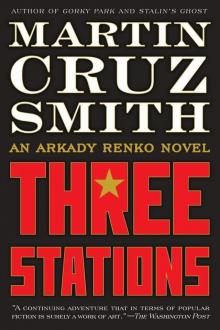 Three Stations
Three Stations Wolves Eat Dogs
Wolves Eat Dogs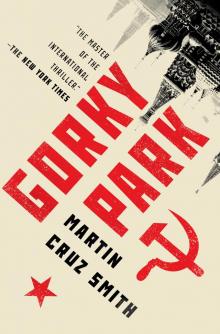 Gorky Park
Gorky Park December 6
December 6 Havana Bay
Havana Bay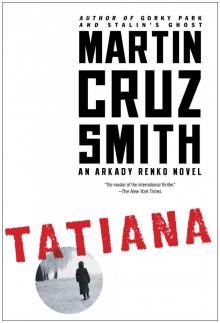 Tatiana
Tatiana The Girl From Venice
The Girl From Venice Stalin's Ghost
Stalin's Ghost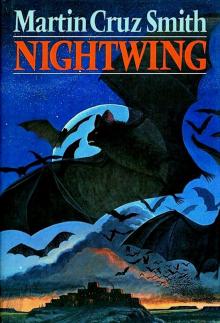 Nightwing
Nightwing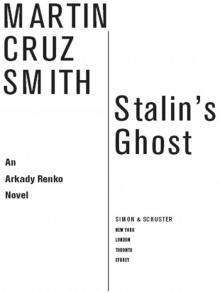 Stalin s Ghost
Stalin s Ghost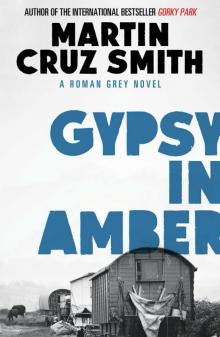 Gypsy in Amber
Gypsy in Amber Rose
Rose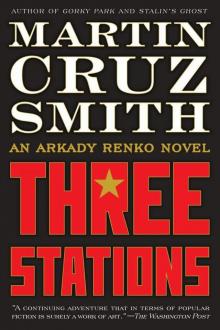 Three Stations: An Arkady Renko Novel
Three Stations: An Arkady Renko Novel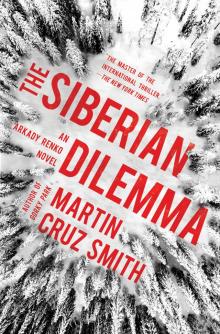 The Siberian Dilemma
The Siberian Dilemma December 6 (V5.0)
December 6 (V5.0)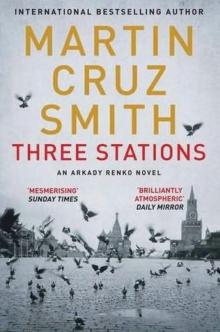 Three Stations ar-7
Three Stations ar-7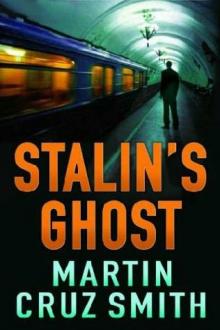 Stalin’s Ghost ar-6
Stalin’s Ghost ar-6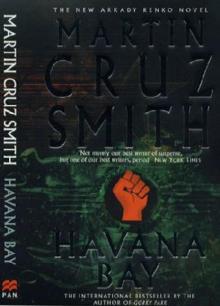 Havana Bay ar-4
Havana Bay ar-4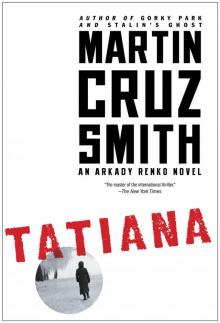 Tatiana ar-8
Tatiana ar-8